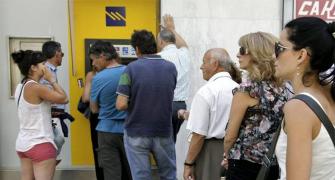A rising number of Greeks in rural areas are swapping goods and services in cashless transactions.

Wild boar and power cuts were Greek cotton farmer Mimis Tsakanikas' biggest worries until a bank shutdown last month left him stranded without cash to pay suppliers, and his customers without money to pay him.
Squeezed on all sides, the 41-year-old farmer began informal bartering to get around the cash crunch.
He now pays some of his workers in kind with his clover crop and exchanges equipment with other farmers instead of buying or renting machinery.
Tsakanikas is part of a growing barter economy that some Greeks deplore as a step backward from modernity, but others embrace as a practical means of short-term economic survival.
When he rented a field this month, he agreed to pay with part of his clover production.
"It's a nightmare. I owe many people money now - gas stations and firms that service machinery. I have to go to the bank every single day, and the money I can take out is not enough," said Tsakanikas, who also grows vegetables and corn on 148 acres (60 hectares) of farmland.
"I've begun bartering in some forms - it existed in the past but now it is growing... Times have become really tough, and friends and relatives help each other out."
A rising number of Greeks in rural areas are swapping goods and services in cashless transactions since the government shut down banks on June 28 for three weeks, restricted cash withdrawals and banned transfers abroad to halt a run on deposits and prevent a collapse of the banks.
That was days before Athens became the first advanced economy to default on an International Monetary Fund loan, forcing it to request a humiliating third financial bailout.
Capital controls are slowly being eased but will remain for months. Even now, Greeks can only withdraw 420 euros a week.
Data on the scale of barter is unavailable since much of it is done informally. But activity on online platforms and anecdotal evidence from farmers and businesses show it is surging, even if on a small scale compared to cash deals.
In remote villages and farming areas like the region around the central town of Lamia, the concept of barter is not new. Farmers have long exchanged goods and services.
But the age-old practice has gained new vigour, reviving traditions from ancient Greece, amid a searing economic crisis.
One of the world's oldest trading nations, the Greeks along with the Phoenicians traded wine, olive oil, wheat and dye across the Aegean and the eastern Mediterranean for centuries.
"Barter has been a part of everyday life for Greeks for a long time," said Haris Lambropoulos, an economist and professor at the University of Patras.
"In the past it was mostly on a family and individual level, but now is expanding due to the developments in the banking sector and capital controls. Now it is a more structured and organised phenomenon."
The growing practice is most visible in rural areas and on islands where farmers are swapping produce with each other, says Konstantinos Michalos, head of the Athens business lobby.
BOOMING BUSINESS
Tradenow, a Website started three years ago to facilitate barter of everything from food to technology, says the number of users and the volume of transactions have doubled since capital controls came into effect on June 29.
"Before capital controls, we were reaching out to companies to encourage them to register," says Yiannis Deliyiannis, the company's chief executive. "Now companies themselves are getting in touch with us to get registered."
He rattles off a list of firms using the site to strike deals with suppliers: a car repairs shop that exchanged tyres with another firm for a new shower cubicle, a burglar alarm provider offering services in return for paper and advertising, an Athens butcher that trades daily meat supplies for services.
The online platform has concluded about 3,000 transactions worth a total of 800,000 euros and Deliyiannis says the business - which relies on commission from the cash portion of any transaction - is now close to breaking even.
Among other Internet-based companies that allow barter is Mermix, a Website that allows farmers to share heavy machinery in return for cash or cashless barter transactions.
Set up three months ago, the platform has around 100 farmers registered on it and expects to break even within two years as business grows, says founder Christos Stamatis, who also heads an agricultural union in Lamia.
"With capital controls and limits on bank transactions, there is a liquidity issue so farmers are increasingly turning to models like ours, as the machinery market is expensive," he said.
Often deals are small, swapping, say, 10 litres of wine for 20 kilos of rice. Larger ones involve trading land and machines.
In the lush yellow and green fields outside Lamia dotted with cotton, peanut and olive groves, barter is also flourishing on an informal basis outside the online platforms.
Farmers say they are ideal candidates for barter since they have expenses throughout the year but only get paid at harvest time. That left them exposed with a shortage of cash on hand when capital controls were imposed in June.
Panagiotis Koutras, a cattle herder and farmer, recalls how he sold clover for animal feed worth 2,000 euros to a farmer who did not have cash and paid him in wheat. Another farmer offered his heavy equipment to cover 4,000 euros of a 6,000 euro bill for products Koutras had supplied him.
Kostas Zavlagas, who produces cotton, wheat, and clover recounted how he gave bales of hay and machine parts to another farmer who did not have cash to pay him.
"He is going to pay me back in some sort of product when he is able to, maybe in cheese," says 47-year-old Zavlagas. "It's representative of the daily issues that farmers face and why they turn to barter trading to resolve them."
Still, for the country's tax inspectors, the practice raises questions about whether it is fuelling endemic tax dodging since it is difficult to monitor whether receipts are issued to ensure value-added-tax is paid.
"Barter is not illegal as long as the relevant legal documents are issued for every transaction," said Christos Kyriazopoulos, research director at the finance ministry's anti-corruption unit. "But we are closely monitoring the phenomenon, it's something that we have our eyes on."
Many Greeks are reluctant to encourage the use of barter or to talk about it openly, fearing it symbolizes a society moving in reverse after seven years of economic crisis.
"Of course, a barter economy is something that we shouldn't aspire to and should be a thing of the past - the last time we had it on a large scale was when we were under occupation," says Stamatis of the Mermix platform, referring to Nazi German rule during World War Two.
"But aren't capital controls a financial form of occupation?"










